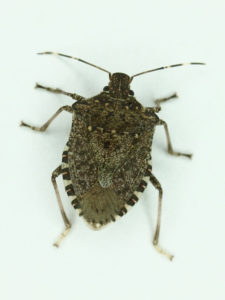By Mike Hillstrom, forest health specialist, Fitchburg. Michael.Hillstrom@wisconsin.gov; 608-513-7690
Invasive brown marmorated stink bugs (BMSB) are now well established and reproducing in southern and central Wisconsin. This fall we are getting our first reports of large numbers of BMSB gathering on the sides of houses looking for places to overwinter. This problem will continue to get worse as stink bug populations increase and their range expands. Damage to important crops, ornamental plants and trees will also be a major concern. BMSB is known to feed on a wide variety of plants including apples, tomatoes, corn, soybeans, silver maple and walnut.

An adult brown marmorated stink bug. Photo by P.J. Liesch, University of Wisconsin Insect Diagnostic Lab.
Researchers are working on ways to manage the pesky bugs. One new method being explored is hanging black netting soaked in insecticide at locations where the bugs congregate, such as doors on the north and east sides of structures.
Samurai wasps are another promising lead. These stink bug-killing wasps found their way into the U.S. on their own over the past few years, but researchers are also working with lab-reared samurai wasps that they hope to release. Samurai wasps parasitize the eggs of BMSB but do not sting humans or other animals.
For more information about identification and management check out:
• University of Wisconsin-Extension
• WisContext
• Midwest Stink Bug app
